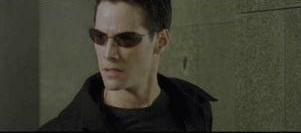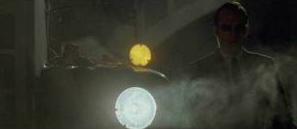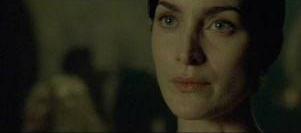Dew's Tips For Character Analysis

While most people associate the words "character analysis" with those dreaded English essays that we are forced to write in school, it is good to know that those skills can be put to other (more enjoyable!) uses. Overall, I have found that studying the characters in my favorite movies, television shows, soap operas, and books can be very rewarding and I hope that you feel the same way.
Therefore, I have compiled some questions for you to consider the next time you want to really think about a character's effect and impact on you. For those of you unfamiliar with some of the literary terms used, I have added a glossery of terms right after the list of questions.
http://hotslayer.com" has a wonderfully written Buffy & Angel character analysis. If you happen to know of any other movie/tv character analysis essays on the web that I should note on this page, please email them to me. Thanks!
Some Questions To Consider
When Analyzing A Character:
1. Determine whether or not the character in question is central to the work's plot or if he/she is a minor character. If the character's role is a minor one, what is his/her function in the story?
2. Is the character the protagonist or antagonist? What conflict(s) appear in the story? (Man vs. Man, Man vs. Society, Man vs. Himself, Man vs. Nature, or Man vs. Fate [God]). What is the nature of the conflict(s)--physical, intellectual, moral, emotional, or spiritual? What qualities do the protagonist and antagonist help bring out in each other?
3. Is the character static or dynamic? Is the character round or flat?
4. Do you think that the character is sterotypical in some way? If so, does the character rise above the sterotype and how is this accomplished?
5. Look at all the ways that the character is created and brought to life (characterization). These can include:
- What the character says and how he/she says it
- What the character thinks and feels
- What the character does (actions)
- What the character looks like physically (body language and appearance)
- What other characters (or the narrator) says about the character
- How the character responds to others as well as her/her environment
- How other characters respond to what the character says or does
6. When creating a character in a story, only a select number of characteristics can be revealed and highlighted. With this in mind:
- What are the character's main physical, mental, emotional, moral, and social characteristics?
- How are the character's characteristics revealed? Are they through circumstances, words, thoughts, actions, or appearances?
- Do these characteristics aid in the character being consistent (in character), believable, adequately motivated, and interesting?
- Do the characteristics of the character emphasize and focus on the character's role in the story's plot?
- What are the character's strengths and weaknesses? Does the character overcome any of his/her weaknesses in the story?
- What are the character's motivations (needs, interests, desires, fears, and goals)? Also look at the education, occupation, environment, economic status, family background, race, sex, and age of the character. How do these two sets of factors affect and shape the character's personality, situation, and actions?
7. If he/she is a dynamic character, look for any mental, emotional and physical changes (or growth) that occur during the course of the story.
- How would you classify the changes? Dramatic or subtle? Sudden or gradual? Are the changes significant or minor to the story's plot and theme?
- Are there any particular situations or forces (such as other characters) that help bring about the development or change?
- Are the changes in the character realistic and believable?
- How does the character learn from, handle, and adjust to new situations (as well as other characters)?
8. Study the external and internal forces that affect, influence, challenge, motivate the character. How do these forces impact the character's personality, outlook, or choices?
9. Consider the position or point of view from which the story is observed and told (omniscient, limited omniscient, first person, or objective). How does this impact your impressions of the character? Do you find the narrator's observations objective, consistent, and credible?
10. How important is the setting of this story to the development of the character?
11. Does the writer use the character to explore or reveal some aspect(s) of human nature or life? If so, explain.
Key Literary Terms
Protagonist: The central character in the story, one who is faced with conflict. We follow this character with interest, whether or not he or she is necessarily good or bad.
Antagonist: Any character or force in the story who presents or causes conflict for the protagonist. The antagonist can even be an element of the protagonist's own nature or personality.
Conflict: A clash of beliefs, needs, desires, ideas, actions, feelings, or goals; a struggle between disagreeing or opposing forces.
Round Character: A well developed, multi-sided, and complex character. It may require an essay to fully analyze the character.
Flat Character: A simple, one-dimensional character. The character is underdeveloped and can be summarized in just a sentence or two. He/she has only a few key traits.
Stock Character: A special type of Flat character. It is a sterotyped figure who has appeared so frequently in fiction that he/she is immediately recognized.
Static Character: A character who does not change in personality, nature, or attitude; he/she is the same sort of person from the beginning of the story until the very end.
Dynamic (Developing) Character: One who undergoes at least one permanent, important change in some aspect of their personality, nature, or attitude.
A Character: A person represented in a drama, story, play, etc.
Characterization: The creation of a fictitious character. In other words, it is the means by which the writer brings a character to life.
A Characteristic: A distinctive quality, feature, or trait possessed by an individual.
Personality: It is the sum total of the physical, mental, emotional, moral, and social characteristics of an individual. It also refers partly to the outer, visible charateristics that determine the impression that a person make upon others. (It also referred to as "character.")
Nature: The characteristic disposition or temperament of a character.
In Character: Behavior that is appropriate to the character's nature.
Out of Character: Behavior that is inappropriate to the character's nature. When a character behaves a particular way on one occasion and then behaves a different way on another without a sufficient reason for the change.
Omniscient Point of View: When the story is told by a narrator who is not a part of the story. He/She is a third person whose knowledge and perceptions are unlimited. This type of narrator can tell us what the characters are thinking and feeling.
Limited Omniscient Point Of View: When the story is told in the third person, but is limited to the viewpoint of just one of the story's characters. In other words, we are only told what one character is really thinking and feeling.
First Person Point Of View: When the story is told in the first person, with the narrator being a character involved the story.
Objective Point Of View (Dramatic Point Of View): This point of view is similar to omniscient, however, the narrator only tells you the characters' actions and what they say out loud. The narrator is a simply a spectator who reports without any commentary, interpretations, or insights into any private thoughts or feelings.
Setting: It involves the time in history that the story takes place as well as the length of time covered by the action in the story. In addition, the setting involves the physical setting, the atmosphere, and the time sequence of the story.
Plot: The series of events that make up the storyline.
Theme: The controlling idea of the story that serves to reveal some insight about human nature or state a central generalization about life. To get at what the theme is ask yourself, "What does this story reveal?" Note that the theme is not necessarily the "moral" or "lesson" in a story--those terms may be too confining in some cases.
**Keep in mind that not all stories have a theme--they may just have a central purpose. This purpose could be to provide some laughter, suspense, scares, thrills, or pose a problem for the audience/reader to try and solve.
Sources For This Page Include:
Random House Webster's Dictionary, Literature: Structure, Sound, and Sense by Laurence Perrine and Tomas R. Arp (Sixth Edition), and one of my English teachers, Mrs. Miller.
© Copyright 1999-2001 by Dew, owner of Dew's Matrix Fan Page. This page cannot be written, copied or reproduced without express written consent.



Return To Home Page




